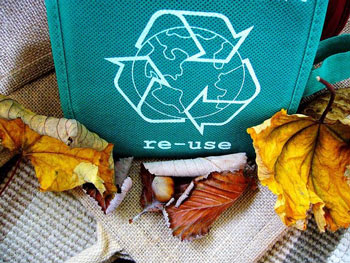News
The Importance of the Three Rs - A SWANA Scholarship Application Essay
August 3, 2022 by Katherine Hynes
As a way of recognizing some of the outstanding scholarship applications nominated to SWANA by our Chapters across the United States and Canada, we are posting applicants' one-page essays on our blog. The essay, which was 10 percent of their application score, was to speak to the role solid waste management plays in addressing an environmental issue currently in the news. We asked, “What are the responsibilities of individuals who generate the waste versus the professionals tasked with managing the waste?”
The following essay was submitted by Katherine Hynes, who applied for the Grant H. Flint Scholarship. She will be attending University of Georgia in the fall with a planned major of Communications (Public Relations).

Two identical bins sit next to each other, their only difference being one is stamped with three little arrows on its face and the other is void of such a picture. The identification of the colossal difference between these two containers has been ingrained in my mind for as long as I can remember. School children alike carry these same memories. Sitting, crisscross-applesauce on the vibrant carpet of the kindergarten classroom, a clip of a cartoon recycling bin flashes across the screen. Immediately, the children erupt in fits of joy and laughter as they are mindlessly taught about the importance of recycling. The longevity and severity of the topic won’t become apparent for them until several years later. This realization might arise in these students during their AP Environmental Science class or at a community service litter clean-up. For me, this realization arose much earlier, within my own home, where I was scolded if I ever threw away an item that was recyclable. The quick, yet mundane, three steps from our trash can to our recycling bin must’ve felt like a marathon to me at the time. But it truly is that simple. “Saving the environment” doesn’t necessarily mean starting some huge environmental project to plant 1,000 trees. While that is a great feat, the first step to “saving the environment” is those quick, little, possibly tedious, three steps, and those three steps begin with education.
Education is where it all begins. Like it or not, the future of our planet lies in the hands of the generations beneath us. Henceforth, our future then lies in the hands of the educators who are tasked with teaching the next generation about the significance of that sing-songy alliteration, The Three R’s. We must not become lax on the thoroughness in which this unit is to be taught. After all, which is more likely to save our lives in the long run: the Pythagorean theorem or the significance recycling has on reducing pollution and saving the planet? I mean, imagine if our children went around living their lives thinking that “The Three R’s” stood for Rihanna, Reese’s, and The Rock—what a glorious, yet trash-filled, decaying world that would be! There is a direct correlation between recycling and the reduction of pollution in the environment. According to Eco-Cycle, recycling paper cuts air pollution by about 75 percent and recycling steel cuts back on 97 percent of mining waste and 86 percent and 76 percent on air pollution and water pollution, respectively. These large reductions begin with something as simple as educating young minds on which bin holds the trash and which bin holds the recyclables.
The role education plays on addressing and reducing the pollution we experience in this world is astronomical. With that weight comes a responsibility. There is a responsibility for those who generate the waste (a.k.a. everyone alive on this planet!) and for those who are tasked with managing the waste. The producers, for starters, have a huge responsibility in ensuring that the consumers are aware of the recyclable status of their product. Three simple arrows is all it takes. Furthermore, producers should work to ensure that all their products and packaging are sustainably produced and are kind to our environment, regardless of how large a corporation. Consumers are tasked with the responsibility of following through on that elementary task that has been ingrained in their minds since the kindergarten carpet. As for those who are tasked with managing the waste, I’ve witnessed firsthand, through my mother, who works tirelessly to ensure that, not only that all recycling truck pick-ups are handled, but also that the children in our community are given the opportunity and information they need to save the planet.







Leave a comment